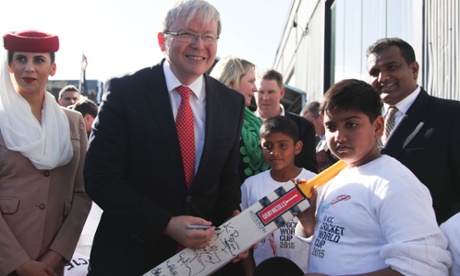By court reporter Jamelle Wells and state political reporter Sarah Gerathy Updated Wed Jul 31, 2013 3:56pm AEST
Video: Criminal charges recommended against Macdonald, Obeid (ABC News)
Photo: LtoR Former NSW ministers Eddie Obeid and Ian Macdonald at the ICAC in Sydney, February 2013. (AAP)
The NSW Independent Commission Against Corruption (ICAC) has recommended former Labor ministers Ian Macdonald and Eddie Obeid face criminal charges over a coal-mining deal.
In a marathon inquiry that ran for months with hundreds of witnesses, Commissioner David Ipp investigated if the pair conspired to defraud the state over the granting of a multi-million-dollar mining licence in the Bylong Valley.
The inquiry heard Mr Macdonald granted the lucrative Mount Penny coal mining lease over land owned by the Obeid family, and that the Obeids encouraged their friends to buy up land in the area and secretly hid their involvement in mining projects though complex company structures.
Today the ICAC found that both men acted corruptly and referred them to the Director of Public Prosecutions (DPP).
Operation Jasper
- Investigated allegations then-mining minister Ian Macdonald rigged a 2008 tender process to put the Obeid family and their associates in a position to profit by up to $100 million.
Operation Jarilo
- Looked into claims accused murderer Ron Medich and former boxer Lucky Gattellari offered Ian Macdonald incentives - including the services of a prostitute called Tiffanie - to arrange business meetings.
Operation Indus
- Aired claims former treasurer and roads minister Eric Roozendaal got a $10,000 discount on a new car from the Obeid family as a bribe.
Operation Acacia (due in August)
- Looked at the Doyles Creek coal exploration licence Ian Macdonald granted without a tender to union boss John Maitland and others.
The same damning findings of corrupt conduct have been made against some of the business identities who bought into the deal and still control the suspect lease.
Eddie Obeid's son, Moses, and businessmen Travers Duncan, John McGuigan, John Kinghorn, Richard Poole, and John Atkinson, have all also been referred to the DPP.
The ICAC has also asked the Crime Commission of New South Wales to investigate the deal, raising the strong prospect that bank accounts will be frozen in an attempt to recover tens of millions of dollars.
The Tax Office has also been asked to investigate conduct by Eddie and Moses Obeid.
Eddie Obeid released a statement shortly after the findings were made public, criticising the "superficiality and bias" of the report.
"I reject the assertions of the Commissioner that I acted in any way that could amount to corrupt conduct," the statement read.
"It will be necessary for me to consult my legal representatives before any detailed response is to be published, but I wish to make it clear that I reserve my rights to seek judicial review in respect of the adverse findings."
In its report the ICAC criticised Mr Obeid's evidence, describing him as an "unimpressive" witness.
"He was an aggressive witness and seemed to be more concerned with imposing his will on proceedings than with simply telling the truth..." the report said.
"It was plain that, if he felt an honest answer could damage his position, he simply evaded providing an answer."
The commission was also scathing about Mr Macdonald, describing him as an "unsatisfactory witness".
"In some instances, the commission has come to the view that Mr Macdonald deliberately gave untrue evidence..." the report said.
"The commission came to a view that Mr Macdonald was tailoring his evidence to fit the evidence of other witnesses, and attempting to concoct an innocent explanation to explain away damning facts."
Impact of findings on federal Labor
Speaking to reporters today, Prime Minister Kevin Rudd said he was disgusted by evidence from the ICAC hearings and insisted corruption would not be tolerated.
"I welcome this report. Anyone who is responsible for illegal or corrupt behaviour should face the full force of the law," he said.
Read the ICAC's Jasper report

Read the ICAC's report of investigations into the conduct of Ian MacDonald, Eddie Obeid and others.But Opposition Leader Tony Abbott has seized on the findings and highlighted the links between NSW Labor and the federal ALP.
"Mr Rudd needs to come clean about all the dealings that senior members of his government have had with Mr Obeid and Mr Macdonald," he said.
He noted former NSW premier Bob Carr, now the Foreign Minister, elevated Eddie Obeid to the state ministry and also underlined the connections within the party's left faction between Deputy Prime Minister Anthony Albanese and Mr Macdonald.
"Mr Rudd is only Prime Minister because the NSW Labor party put him there," Mr Abbott said.
"And if he ever seriously tackles the rotten-ness at the heart of the NSW Labor party he will be dealt with by the warlords of Sussex Street again, as he was back in June of 2010.
"Mr Rudd simply can't wash his hands of this."
Former NSW premier Nathan Rees said both Mr Macdonald and Eddie Obeid have tainted the reputation of the Labor party across Australia.
"I feel ashamed about the behaviours that have been aired, in the ICAC and I know many of my colleagues do," he said.
"I sacked Ian Macdonald so in a way I hold my head up high on this stuff. I believe I did the right thing at the time and if the circumstances arose again then I'd do exactly the same thing."
He added that he believed the ICAC findings will have a significant impact on the chances of Labor at the upcoming federal election.
"I make it my business to talk to lots of people in my electorate and the infamy of the characters involved has spread into the federal sphere and the federal election campaign," Mr Rees said.
Ex-treasurer Eric Roozendaal cleared of corruption
As part of a series of public hearings, the ICAC also investigated if former roads minister and treasurer Eric Roozendaal was bribed with a discount on a car.
Photo: Cleared: Eric Roozendaal. (AAP: Paul Miller)
Mr Roozendaal told the ICAC last year he was not very good with his personal finances.
The inquiry was told the Obeid family offered Mr Roozendaal a $10,000 discount on a new car as a bribe, primarily to fast-track roads projects.
Mr Roozendaal has been found not corrupt by the commission, but it found Moses Obeid acted corruptly by arranging the cheap car for him.
The ICAC says Mr Roozendaal's actions showed a lack of "judgement or insight" but the report says there is insufficient evidence to prove the former minister knew about the "various financial transactions" that were undertaken behind the scenes.
In a statement, Mr Roozendaal said he welcomed the ICAC "clearing me and restoring my reputation".
"I have always maintained that I acted appropriately and ethically during my parliamentary career and in the best interests for the people of NSW," he said.
"This time has been very difficult and traumatic for my family and friends and I thank them for their support and love.
"I am glad we can now move on."
Corrupt findings over prostitute bribe
In another hearing the ICAC considered whether Mr Macdonald had been bribed with the services of an escort.
The commission has found Mr Macdonald, businessman Ron Medich and former boxer Lucky Gatellari engaged in corrupt conduct over the case.
It found Mr Macdonald exercised his influence as the energy minister to arrange a meeting between Mr Medich and Country Energy executives at the Tuscany Restaurant in Leichardt in 2009.
Video: The ABC's Quentin Dempster analyses the ICAC's findings (ABC News)
At the time Mr Medich had business interests that he wanted to promote to the executives and the ICAC's found that he and his sidekick Lucky Gattelari also acted corruptly by arranging for the services of prostitute called Tiffanie for Mr Macdonald as a reward for setting up the meeting.
Commissioner David Ipp says the DPP should consider prosecuting Mr Macdonald on charges including misconduct in a public office and corruptly receiving benefits as a reward.
It also recommending charges against Mr Medich.
The offences being suggested carry jail terms of up to seven years.
The ICAC is also giving information from the inquiries to the Australian Securities and Investments Commission over possible breaches of the Corporations Act.
And it says it will also bring to the attention of the Australian Stock Exchange evidence of attempts by some company directors to evade a request for information.
Findings of a fourth investigation over a mining licence Mr Macdonald granted without a tender are due to be handed down next month.



 Kevin Rudd signs a cricket bat during the official launch of the ICC Cricket World Cup to be held in Australia and New Zealand in 2015. Photograph: Asanka Brendon Ratnayake/LNP
Kevin Rudd signs a cricket bat during the official launch of the ICC Cricket World Cup to be held in Australia and New Zealand in 2015. Photograph: Asanka Brendon Ratnayake/LNP










